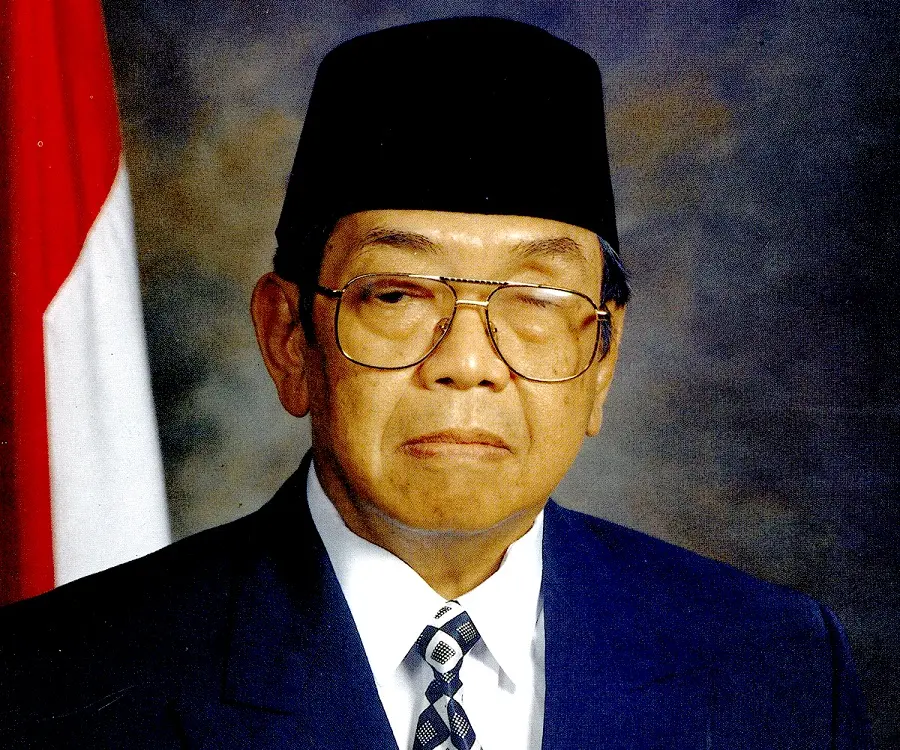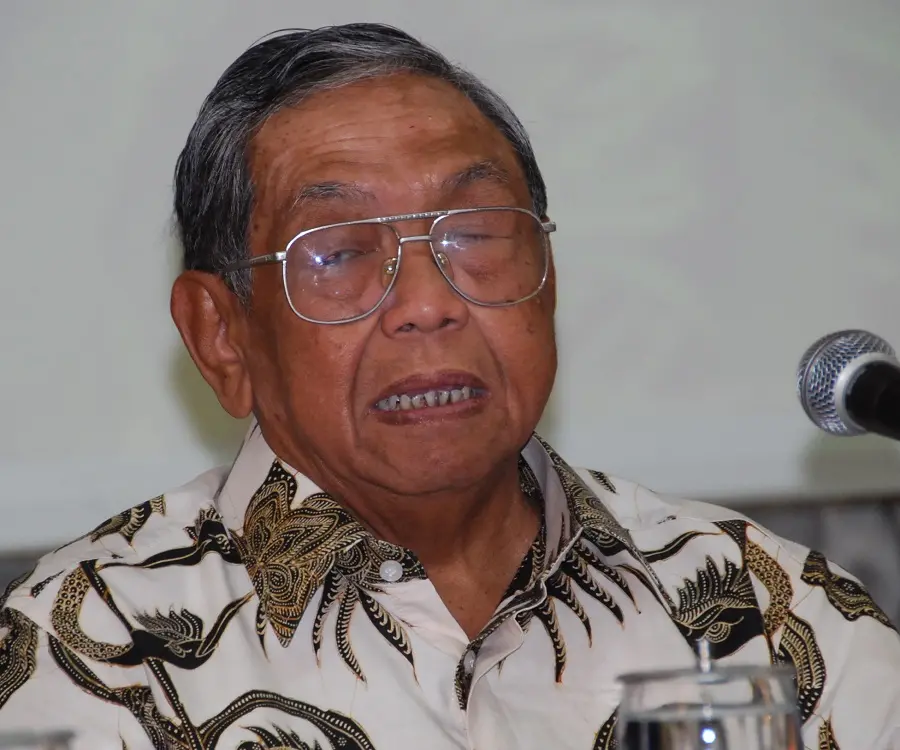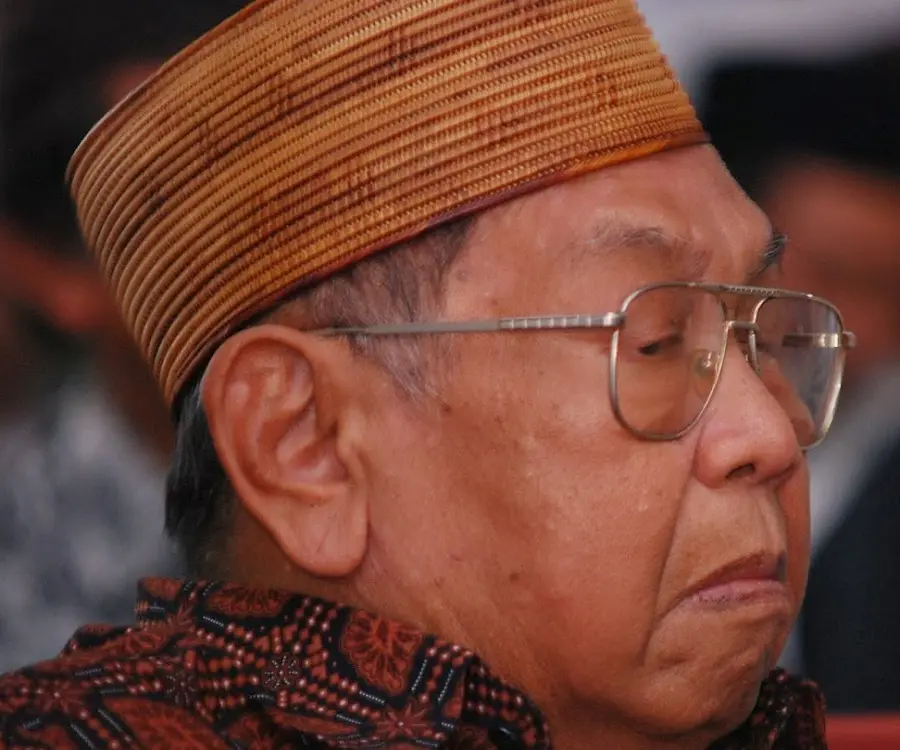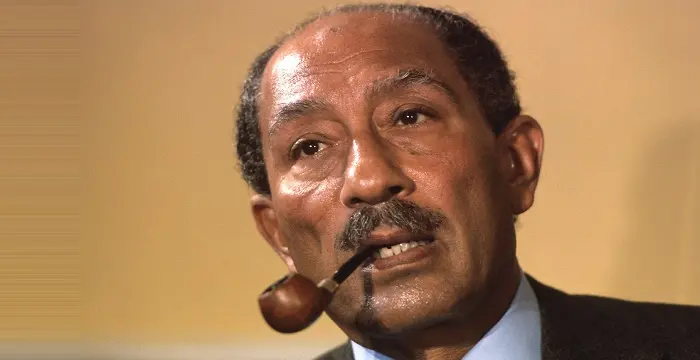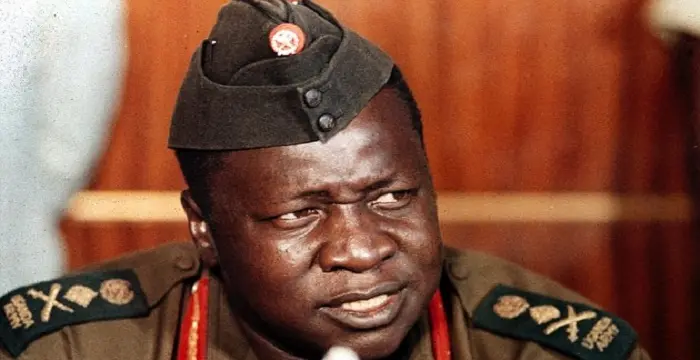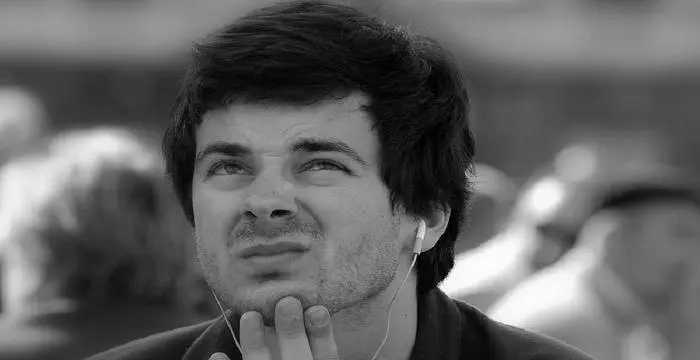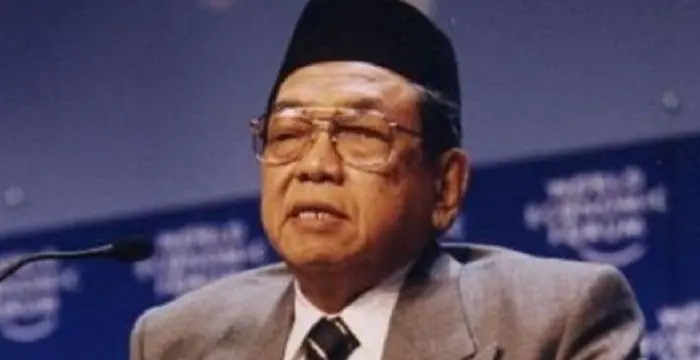
Abdurrahman Wahid - Former President of Indonesia, Birthday and Facts
Abdurrahman Wahid's Personal Details
Abdurrahman Wahid was a religious and political leader and served as the President of Indonesia
| Information | Detail |
|---|---|
| Birthday | September 7, 1940 |
| Died on | December 30, 2009 |
| Nationality | Indonesian |
| Famous | Leaders, Presidents, Former President of Indonesia |
| Nick names | Gus Dur |
| Spouses | Sinta Nuriyah |
| Known as | Abdurrahman Addakhil |
| Universities |
|
| Birth Place | Jombang Regency |
| Religion | Islam |
| Gender | Male |
| Father | K. H. Wahid Hasyim |
| Mother | Ny. Hj. Sholehah |
| Sun Sign | Virgo |
| Born in | Jombang Regency |
| Famous as | Former President of Indonesia |
| Died at Age | 69 |
Abdurrahman Wahid's photo
Who is Abdurrahman Wahid?
Abdurrahman Wahid, the 4th President of the Republic of Indonesia, was born in a prominent family, and represented Indonesia’s modern and moderate views. Equipped with religious education and modern thinking, he became the Chairman of Nahdlatul Ulama (NU), and founded the National Awakening Party (PKB). Following Dictator Suharto’s resignation, he was elected President by the Assembly. As the head of a coalition cabinet, he faced a lot of political constraints. During his 20-month tenure, he tried to reduce the dominance of the army in political and social matters. Two ministries, the Ministry of Information and the Ministry of Welfare, were methodically dismantled because of their poor records. A firm believer in pluralism, he reached out to ethnic Chinese, and participated in peace talks with separatists in East Timor and Aceh. Internationally, he became respected for his promotion of peace and understanding. Despite being the leader of the world’s most populous Muslim country, he had great respect for Israel, and visited the country 6 times. His reforms did not go down well with the army and some vested interests in his cabinet and this slowly and gradually fanned the growing unrest. Following his impeachment, he continued to serve the country as an opposition leader.
// Famous Leaders
Edi Rama
Edi Rama is the current Prime Minister of Albania. Check out this biography to know about his childhood, life, achievements, works & timeline.
Tecumseh
Tecumseh was a Native American leader of the Shawnee clan. This biography profiles his childhood, life and timeline.
Khalifa bin Zayed Al Nahyan
Sheikh Khalifa bin Zayed Al Nahyan is the current President of the United Arab Emirates (UAE). Check out this biography to know about his birthday, childhood, family life, achievements and fun facts about him.
Childhood & Early Life
Abdurrahman ad-Dakhil Wahid was born to Abdul Wahid Hasyim and Siti Solichah. Named after Abd ar-Rahman I of the Umayyad Caliphate and nicknamed "ad-Dakhil" ("the conqueror"), he became popular by the name Gus Dur.
The oldest of five siblings, he belonged to a very prominent family in East Java. His father participated in the nationalist movement and was Indonesia's first Minister of Religious Affairs.
He attended KRIS Primary School and Matraman Perwari Primary School in Jakarta. In 1957, he passed Junior High School, in Yogyakarta, Java region. He shifted to Magelang to obtain Muslim Education at Tegalrejo Pesantren.
He enrolled at the Higher Institute for Islamic and Arabic Studies in 1965, but did not like the rote learning method used by the University. He also began to work at the Indonesian Embassy.
Career
In Egypt, when he was working at the Indonesian Embassy, the 30 September Movement, a coup led by Communist Party of Indonesia, happened and Wahid was charged with writing the reports.
He transferred to the University of Baghdad and moved to Iraq, but continued associating with the Association of Indonesian Students and writing articles for Indonesian readers. He returned to Indonesia in 1971.
He joined the Institute for Economic and Social Research, Education and Information (LP3ES), whose members were progressive Muslim intellectuals, and as an important contributor to its magazine Prisma, toured the pesantren and madrasahs across Java.
In 1977, he became the Dean of the Faculty of Islamic Beliefs and Practices at the Hasyim Asyari University, and served well in that capacity. He also delivered speeches to the Jombang Muslim community.
He joined the Nahdlatul Ulama’s (NU) Religious Advisory Council. Before the 1982 Legislative Elections, he campaigned for the United Development Party (PPP), formed by the union of four Islamist parties including NU.
In 1983, the NU agreed with President Suharto on the implementation of Pancasila as the basic ideology for all organizations. The NU decided to focus on social issues, by withdrawing the NU from politics.
In1984, he was elected Chairman of NU, and sought changes in the pesantren education system so that it could compete with secular schools. He became close to Suharto as his Pancasila indoctrinator.
He continued as Chairman of NU for two more terms. He refused to join the Reform Committee proposed by Suharto who resigned as President of Indonesia in 1998, amidst growing discontent and student protests.
He supported the formation of PKB, a new political party, and became the Chairman of its Advisory Council in 1998. He also became their presidential candidate for the forthcoming elections.
In 1999, the People's Consultative Assembly of the Republic of Indonesia (MPR) elected him Indonesia's fourth president defeating Megawati. He convinced a disheartened Megawati to stand for vice-presidential election, which she won.
As president, he won the hearts of the Chinese minority by declaring the Chinese New Year an optional holiday, lifting curbs on the use of Chinese characters and giving official religion status to Kongfucu.
In 2000, he faced two scandals – the Buloggate related to the disappearance of $ 4 million from the inventory of Bulog (state logistics agency), and the Bruneigate, of embezzling $ 2 million donated by the Sultan of Brunei.
During his presidency, he visited the ASEAN countries, Israel, Japan, Kuwait, Jordan, China, Saudi Arabia, India, South Korea, Thailand, Brunei, Pakistan, Egypt, the United States, and many European countries.
His relations with TNI, the country’s armed force, deteriorated over his efforts to reduce military dominance in politics. He also did not like the fact that they were arming Laskar Jihad in Maluku.
Indonesia seemed headed for anarchy as the country faced terrorist attacks, and the cabinet members became openly diffident. The MPR impeached him, and Megawati became President in 2002.
He formed a political coalition called United Awakened Archipelago in 2005, and criticized the Yudhoyono Government. He was also involved in the activities of the nonprofit organization, The Wahid Institute, founded by him.
Major Works
Wahid’s National Unity Cabinet, in 1999, abolished the Ministry of Information, which controlled the media during the Suharto regime. He also dismantled the corrupt Ministry of Welfare for extorting money from the poor.
Faced with separatist movements, he offered East Timor autonomy, instead of independence. He held peace talks with the Free Aceh Movement’s commander Abdullah Syafii and achieved a ‘humanitarian pause’ in 1999.
Awards
In 1993, Abdurrahman Wahid received the prestigious Magsaysay Award for his efforts to promote inter-religious relations in Indonesia within a democratic society. The award is referred to as ‘Asia's Nobel Prize’.
In 2003, he received the Friends of the United Nations Global Tolerance award for promoting the principles of the United Nations, and the Appeal of Conscience Foundation Award, four years later.
He was conferred honorary doctorates by the Netanya University (Israel), Konkuk and Sun Moon universities (South Korea), Soka Gakkai University (Japan), Thammasat University (Thailand), Pantheon Sorborne University (France), and many other universities around the world.
Personal Life & Legacy
Wahid married Sinta Nuriyah and fathered four daughters: Alissa Qotrunnada Munawaroh, Zannuba Arifah Chafsoh (Yenny Wahid), Annita Hayatunnufus, and Inayah Wulandari.
He died due to diabetes-related complications, and was buried at his birthplace, Jombang.
Trivia
This Indonesian president loved listening to classical music especially Beethoven’s Symphony No. 9th, Mozart in 20th piano concerto, Egyptian Umm Khulsum, Janis Joplin and Indonesian singer Ebiet G. Ade.
He declared, “The most important thing about Islam is that we have to differentiate between two kinds of Islam. The first one is the institution of Islam; second, the culture of Islam”.
// Famous Presidents
Khalifa bin Zayed Al Nahyan
Sheikh Khalifa bin Zayed Al Nahyan is the current President of the United Arab Emirates (UAE). Check out this biography to know about his birthday, childhood, family life, achievements and fun facts about him.
Anwar Sadat
Anwar Sadat was the third President of Egypt and has been awarded the Nobel Prize for his peace initiatives. To know more about his childhood, career, profile and timeline read on the following biography.
Idi Amin
A Ugandan dictator, Idi Amin is remembered for his brutal regime and crime against humanity. Check this biography to know in details about his life, childhood, profile and timeline.
Abdurrahman Wahid biography timelines
- // 7th Sep 1940Abdurrahman ad-Dakhil Wahid was born to Abdul Wahid Hasyim and Siti Solichah. Named after Abd ar-Rahman I of the Umayyad Caliphate and nicknamed "ad-Dakhil" ("the conqueror"), he became popular by the name Gus Dur.
- // 1957He attended KRIS Primary School and Matraman Perwari Primary School in Jakarta. In 1957, he passed Junior High School, in Yogyakarta, Java region. He shifted to Magelang to obtain Muslim Education at Tegalrejo Pesantren.
- // 1965He enrolled at the Higher Institute for Islamic and Arabic Studies in 1965, but did not like the rote learning method used by the University. He also began to work at the Indonesian Embassy.
- // 1st Oct 1965In Egypt, when he was working at the Indonesian Embassy, the 30 September Movement, a coup led by Communist Party of Indonesia, happened and Wahid was charged with writing the reports.
- // 1971He transferred to the University of Baghdad and moved to Iraq, but continued associating with the Association of Indonesian Students and writing articles for Indonesian readers. He returned to Indonesia in 1971.
- // 1977In 1977, he became the Dean of the Faculty of Islamic Beliefs and Practices at the Hasyim Asyari University, and served well in that capacity. He also delivered speeches to the Jombang Muslim community.
- // 1982He joined the Nahdlatul Ulama’s (NU) Religious Advisory Council. Before the 1982 Legislative Elections, he campaigned for the United Development Party (PPP), formed by the union of four Islamist parties including NU.
- // 1983In 1983, the NU agreed with President Suharto on the implementation of Pancasila as the basic ideology for all organizations. The NU decided to focus on social issues, by withdrawing the NU from politics.
- // 1984In1984, he was elected Chairman of NU, and sought changes in the pesantren education system so that it could compete with secular schools. He became close to Suharto as his Pancasila indoctrinator.
- // 1993In 1993, Abdurrahman Wahid received the prestigious Magsaysay Award for his efforts to promote inter-religious relations in Indonesia within a democratic society. The award is referred to as ‘Asia's Nobel Prize’.
- // 1998He continued as Chairman of NU for two more terms. He refused to join the Reform Committee proposed by Suharto who resigned as President of Indonesia in 1998, amidst growing discontent and student protests.
- // 1998He supported the formation of PKB, a new political party, and became the Chairman of its Advisory Council in 1998. He also became their presidential candidate for the forthcoming elections.
- // 1998In 1999, the People's Consultative Assembly of the Republic of Indonesia (MPR) elected him Indonesia's fourth president defeating Megawati. He convinced a disheartened Megawati to stand for vice-presidential election, which she won.
- // 1999Wahid’s National Unity Cabinet, in 1999, abolished the Ministry of Information, which controlled the media during the Suharto regime. He also dismantled the corrupt Ministry of Welfare for extorting money from the poor.
- // 1999Faced with separatist movements, he offered East Timor autonomy, instead of independence. He held peace talks with the Free Aceh Movement’s commander Abdullah Syafii and achieved a ‘humanitarian pause’ in 1999.
- // 2000In 2000, he faced two scandals – the Buloggate related to the disappearance of $ 4 million from the inventory of Bulog (state logistics agency), and the Bruneigate, of embezzling $ 2 million donated by the Sultan of Brunei.
- // 2002Indonesia seemed headed for anarchy as the country faced terrorist attacks, and the cabinet members became openly diffident. The MPR impeached him, and Megawati became President in 2002.
- // 2003In 2003, he received the Friends of the United Nations Global Tolerance award for promoting the principles of the United Nations, and the Appeal of Conscience Foundation Award, four years later.
- // 2005He formed a political coalition called United Awakened Archipelago in 2005, and criticized the Yudhoyono Government. He was also involved in the activities of the nonprofit organization, The Wahid Institute, founded by him.
- // 30th Dec 2009He died due to diabetes-related complications, and was buried at his birthplace, Jombang.
// Famous Virgo Celebrities peoples
Temple Grandin
Temple Grandin is a well-known American writer, autistic activist and animal expert. This biography profiles her childhood, life, achievements, career and timeline
Alex Holtti
Check out all that you wanted to know about Alex Holtti, the famous Danish Viner & YouTuber; his birthday, his family and personal life, his girlfriends, fun trivia facts and more.
Benjamin Atkinson
Benjamin Atkinson is the son of the world-renowned British actor and comedian, Rowan Atkinson. Check out this biography to know about his childhood, family, personal life, including his age, birthday, etc.
Jack Dylan Grazer
Jack Dylan Grazer is an American actor known mainly for his performance in the movie version of ‘Stephen King’s novel ‘It.’ Check out this biography to know about his childhood, family, personal life, birthday, etc.
Ted Williams
Ted Williams was an American baseball player. Read this biography to learn more about his profile, childhood, life and timeline.
Mia Diaz
All about American dancer and actor Mia Diaz, including her age, family life, birthday, boyfriends, net worth, and some fun facts.
Abdurrahman Wahid's FAQ
What is Abdurrahman Wahid birthday?
Abdurrahman Wahid was born at 1940-09-07
When was Abdurrahman Wahid died?
Abdurrahman Wahid was died at 2009-12-30
Where was Abdurrahman Wahid died?
Abdurrahman Wahid was died in Jakarta
Which age was Abdurrahman Wahid died?
Abdurrahman Wahid was died at age 69
Where is Abdurrahman Wahid's birth place?
Abdurrahman Wahid was born in Jombang Regency
What is Abdurrahman Wahid nationalities?
Abdurrahman Wahid's nationalities is Indonesian
What is Abdurrahman Wahid nick names?
Abdurrahman Wahid's nickNames is Gus Dur
Who is Abdurrahman Wahid spouses?
Abdurrahman Wahid's spouses is Sinta Nuriyah
What was Abdurrahman Wahid universities?
Abdurrahman Wahid studied at Al-Azhar University, Karachi Grammar School, University of Baghdad
What is Abdurrahman Wahid's religion?
Abdurrahman Wahid's religion is Islam
Who is Abdurrahman Wahid's father?
Abdurrahman Wahid's father is K. H. Wahid Hasyim
Who is Abdurrahman Wahid's mother?
Abdurrahman Wahid's mother is Ny. Hj. Sholehah
What is Abdurrahman Wahid's sun sign?
Abdurrahman Wahid is Virgo
How famous is Abdurrahman Wahid?
Abdurrahman Wahid is famouse as Former President of Indonesia
